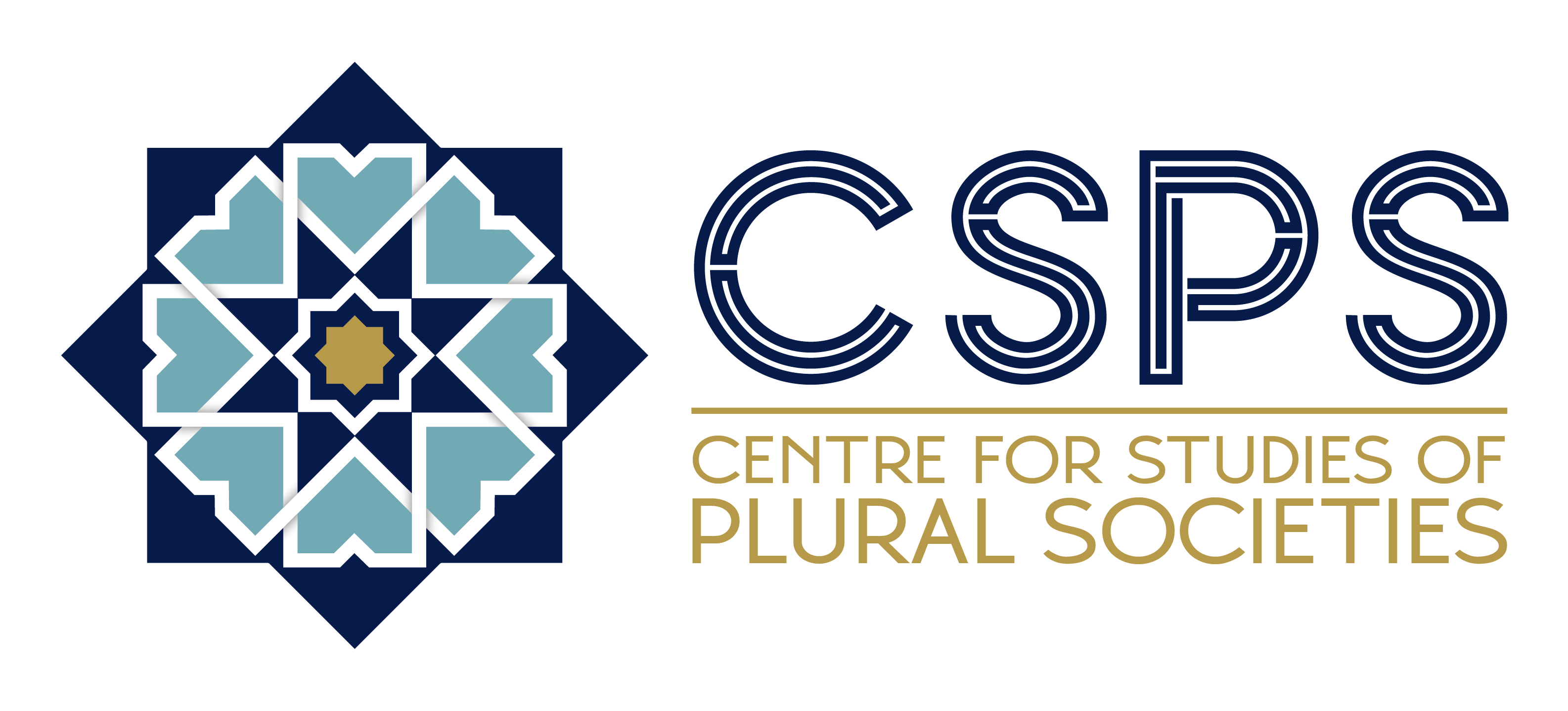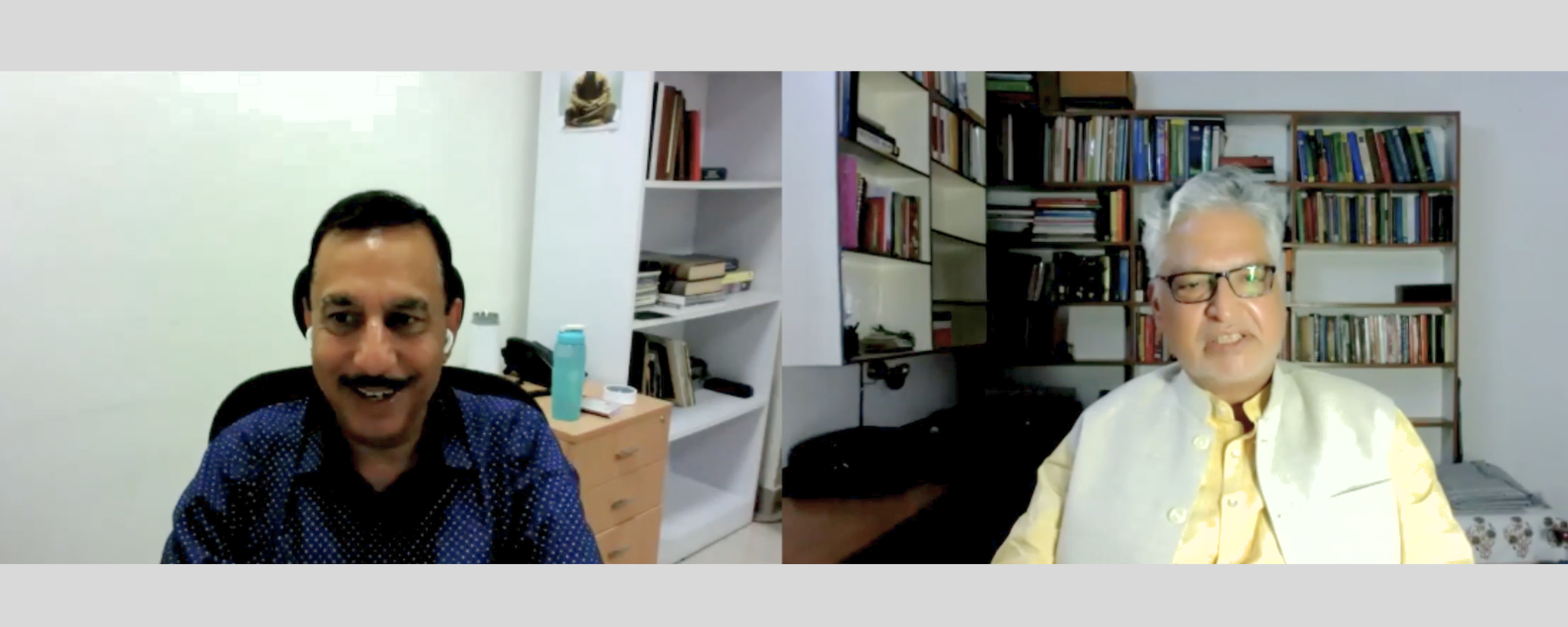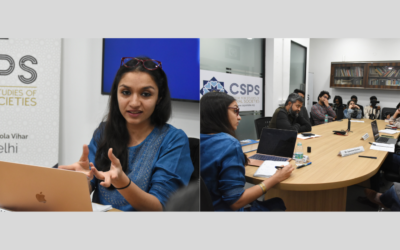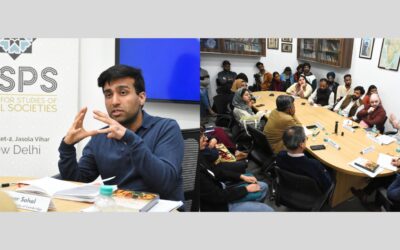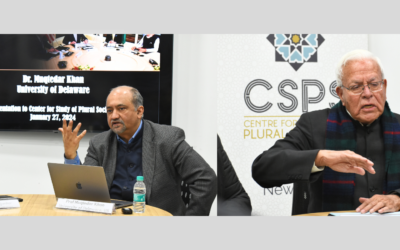Centre for Studies of Plural Societies (CSPS) organized an online lecture on “Crisis of Academic Ethics.” The keynote speaker for the event was Prof Sunil Mukhi, Honorary Professor Emeritus at the Indian Institute of Science Education and Research, Pune. The lecture was based on Prof Sunil’s article on “The Ethics of Excellence: Improving Academic Research” which was published in The Hindu. The event was chaired by Prof Furqan Qamar, Professor of Management at Center of Management Studies, Jamia Milia Islamia, New Delhi.
About the Lecture:
The lecture began with a brief introduction of the Speaker and the Chair by CSPS Research Coordinator Dr Sheeba Naaz. The chair acknowledged the efforts of Dr Omar Anas, Director at CSPS and of his team members. Prof Furqan, then invited the key speaker to highlight the importance of ethics in academia and to sensitize the audience about the same.
Prof Sunil Mukhi, in his introductory remarks started by mentioning two quotes by Rabindranath Tagore and Albert Einstein on the issue of ethics. He underlined the basic meaning of ethics and how it is different from law. Prof Sunil emphasized that ethical principles are diverse in nature by giving reference to ethics in different areas of study such as Physics, Chemistry, Biology and Humanities. He also pointed out that our ethics and principles are shaped by the environment we are situated in. Moreover, ethics are also influenced by our philosophical and religious background, although it is not necessary that our ethical ideas are linked to our birth religion. To support his statement, he mentioned being schooled at a Christian school and he believes that somehow his values and ethics are linked to his Christian theology.
Prof Sunil explained how we humans are conditioned to stick to whether something is right or wrong, however ethics is beyond some yes or no and that we, especially in academia should not come to conclusion without making any efforts as ethics is a complex and subtle topic. He put forward two simple ethical considerations which academicians should follow as they are unfortunately missing from them in our country, first is reciprocity, this means that when we do not consider someone plagiarizing our work ethical, therefore we should think the same for others. Second, outcome-directedness, which means if a certain behavior is meeting a valid goal. Ethical behavior leads to positive outcome. For example, the concept of cheating in an exam.
While exploring these two considerations, he mentioned about how they fail in their respective terms. It is the system that must be blamed for being the way it is as people who are caught in plagiarism case argue that if their seniors are getting away with plagiarism then why not me. In the case of outcome-directedness, when a student cheats, he fails to realize the outcome of cheating as it creates a negative credibility of the Indian academics.
Prof Sunil highlighted three ethical problems that academicians face. First are unacceptable practices, second is insufficiently enabling environment one of the examples of this problem can be discrimination based on religion, color, gender, etc. Third is mishandling of cases that come up, this is the responsibility of the people at higher positions such as the director or vice chancellor. To address these problems, he suggested that we should have written ethical guidelines, training in these guidelines and then eventually implementing them. He proposed that every researcher or post-doctoral fellow or a faculty member should be given a proper interactive training session on the ethical guidelines after joining any institute so that they can ponder upon why they must follow those guidelines
He further went on to explain the implementation of ethical guidelines which he believes lacks balance and proportion. When a complaint of ethical misconduct is received the authorities must check the facts, reiterated Prof Sunil. After verifying the facts, the authorities should in a fair and just manner confront the accused person and when proved guilty should be given appropriate punishment which is not necessarily a death penalty or dismissal. He also pointed out the reasons why complaints are ignored in academics, firstly because the subject of the complaint is a powerful person. Secondly, institutions ignore them because if misconduct is found it will tamper the image of the institution, however Prof Sunil argued that these institutions do worst by not dealing with a misconduct. The third reason of ignoring the complaints is due to the fear that the subject of the complaint may take them to the court.
Prof Sunil addressed the fact that in some way or other everyone is guilty of minute plagiarism possibly due to insufficient understanding or carelessness, which he believes is not a huge problem and that one should not be on red alert all the time. He also highlighted that the most important thing should be correction and not dismissal or punishment when caught guilty of plagiarism
He also enlightened the audience on image manipulation which is a growing problem in scientific areas according to him. A website known as pubpeer.com highlights complaints of image manipulation. There are two polar views of this website one is that if someone is accused on it then that person should be punished, and the other counter view is that people post anonymously therefore we cannot trust the complaints and it should be ignored. Prof Sunil also mentioned that the rates of retraction are rising since the past twenty years of published papers in scientific journals. Retraction can be of honest mistake or misconduct; it requires us to verify the facts before penalizing a person for honest mistake.
Prof Sunil concluded his lecture by highlighting the fact that ethical misconduct in Indian universities is at an alarming state and the higher authorities are self-satisfied with those situations. However, when such attitude of those higher authorities is questioned then the person complaining faces charges for their opinion. It leads to the conclusion that one can get away with ethical misconduct but not by criticizing someone powerful. He reiterated that if we hold on by the principles of reciprocity and outcome-directedness then situation can improve but the question is how long it will take to reach that stage.
The session ended!
The chair, Prof Furqan Qamar highlighted a recent trend of resorting to futuristic technology (ChatGPT, Quillbot, Grammarly, etc.,) while producing academic papers. But he pointed out that it is not a technological problem rather it is a human problem. He went on to explain how it is the responsibility of the institution, supervisors, and evaluators to give proper guidance on how to ethically produce a paper so that the students never face difficulties in their careers. He also mentioned that the universities should have at least minimum tolerance against ethical misconduct, and he agreed with Prof Sunil that a proper training should be given to everyone. However, he believes that these ideas should be imparted at an early age of a person’s life. Prof Furqan summarized the lecture by saying that institutions are a part of society, how we behave in a society reflects in institutions of higher education. Therefore, with education we should build a better society.
The session was further followed by a question-and-answer session. Dr Sheeba Naaz delivered vote of thanks and gratitude to the speakers and distinguished participants.
About the Speaker:
Sunil Mukhi has a PhD in theoretical physics, with a specialization in quantum field theory and supersymmetry, from Stony Brook University, USA. He held a postdoctoral position at the International Centre for Theoretical Physics, Trieste, Italy and was a faculty member at the Tata Institute of Fundamental Research Mumbai for 27 years where he held the posts of Senior Professor, Dean, Graduate Studies and Chair, Department of Theoretical Physics, before joining IISER Pune. Prof. Sunil Mukhi’s research addresses fundamental properties of the theory of quantum fields and strings. It includes the study of conformally invariant quantum theories, which are useful to understand both critical systems at phase transitions as well as the propagation of strings. Another major area of study has been the existence and role of duality symmetries in string and field theory, and the nature of localized and extended excitations in these theories.
About the Chair:
Furqan Qamar is a former vice-chancellor of University of Rajasthan and first vice-chancellor of Central University of Himachal Pradesh. Earlier he was associated with Association of Indian Universities. Professor Furqan Qamar was the Secretary General of the Association of Indian Universities, i.e., the principal executive officer of the largest and one of the oldest networks of universities. He has also served as Advisor (Education) in the Planning Commission of India. A Professor of Management, he has keen research interest in public policy, planning, administration, and financing of higher education and has numerous publications in journals of repute to his credit. Professor Qamar, thus, brings with him academic eminence, leadership qualities and exposure to best global practices. Furqan Qamar is serving as Professor in CMS (Center for Management Studies), He has published 35 research papers and several Articles in National newspapers Jamia Millia Islamia.
The report is prepared by Azka Khan and Fariha Ahmed, research interns at CSPS
